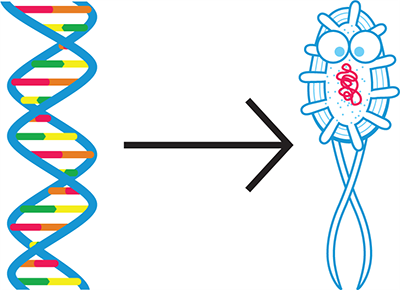There is no doubt that climate change is a global issue but it seems to bite harder on Africa as 7 of the 10 countries that are most vulnerable to it are reported by African Development Bank to be in Africa. As if to cement the continent’s vulnerability, the United Nation Environment Programme (UNEP) estimates that by 2050, the cost of tackling climate change across Africa could reach $50 billion. The effects of climate change will be felt in fields such as agriculture, tourism, energy generation, etc.
The question is, how is Africa working to increase her adaptive capacity in the face of these impending environmental issues? Ecologists and environmental scientists are coming up with combative measures for climate change. One of such is synbiotic biology, sometimes known as synbio. The National Human Genome Research Institute defines synthetic biology as “a field of science that involves redesigning organisms for useful purposes by engineering them to have new abilities.” Synbio finds application in medicine, agriculture, manufacturing, among other fields.
Although most synthetic biology applications focus on medicine and microbiology, the notable expansion of its use to solve environmental issues is very timely. With synthetic biology, it is possible to repurpose organisms to synthesize needed substances or make them gain a new or adaptive ability for optimal performance in the ecosystem. One common example can be seen in the editing of genetic information in rice to produce beta carotene (a nutrient in carrots). This was done to make rice supply vitamin A, a very essential vitamin whose deficiency results in 250,000 – 500,000 cases of blindness in children annually. Researchers reasoned that since rice is a staple in high risk areas, rice with beta carotene components would greatly reduce child mortality due to this disease.
Read Also: Kenyan Environpreneur, Eddy Gitonga, Invents Smart Trash Bin
Similarly, synbio makes harnessing the power of nature to create solutions for pressing climate change problems like increasing temperature levels in both oceans and land. If not well-exploited, Africa will be prone to high biodiversity and crop yield loss if temperature rises above 1.5°C. This is in accordance with a 2018 report by the Intergovernmental Panel on Climate Change (IPCC), which predicts grave consequences for the continent if temperatures continue to rise.
In addition to this, another specific application of synthetic biology to stem the climate change problems in Africa include saving the reefs of Seychelles, Zanzibar, and Madagascar. These reefs, which have attracted tourist attraction and created employment opportunities for many Africans in the east coast of Africa, are threatened by increasing heat stress. The colorful reefs are discoloring and the oceanic diversity is at stake. With synthetic biology, Stanford University researchers have identified genes that can be edited to improve the coral reefs’ ability to cope with high temperatures, thereby increasing their resilience.
According to Elia Tebandeke Nalwadda, in Alliance for Science, synbio has also found application in helping plant roots grow deeper into low water tables to access water when there’s little rainfall. This has the potential to help Africa to reduce their overdependence on rainfed agriculture which has been the bane on optimum agricultural production in many African countries. Aside from these applications, the generation of clean energy from synthetic fuels through an animal that naturally secretes ethanol is interesting. Africa might be near the end of her power crises, who knows?
While researchers continue to work on new applications of synbio, many worry about how synthetic biology could lead to the creation of more genetically modified organisms (GMOs) most of which have some negative effects on man and the environment. However, scientists have given the assurance that gene editing techniques in synbio are different and very sustainable.
Ehi-kowoicho Ogwiji is a storyteller and natural scientist who is given to advocacy for a science-literate Africa. Ehi-kowoicho aspires to be a renowned science communicator and STEM thought leader in Africa and beyond. She writes from Abuja, Nigeria. Connect with her on social media @ogwijiehi or email her at [email protected]










